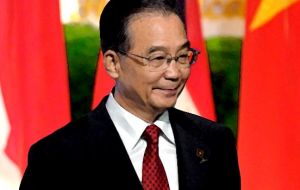MercoPress. South Atlantic News Agency
China’s 3 trillion USD reserves intensify debate on Yuan convertibility
 Premier Wen Jiabao’s policy of controlling the currency at the heart of the debate
Premier Wen Jiabao’s policy of controlling the currency at the heart of the debate China's foreign exchange reserves exceeded the mark of 3 trillion US dollars for the first time at the end of March 2011, representing an increase of 24% from a year earlier. China retains the world’s leading position in forex reserves, according to data released by the country’s central bank.
Reserves were up by 197 billion US dollars in the first quarter of 2011 from 2.9 trillion US dollars at the end of 2010, with 84 billion US dollars in January, 60 billion US dollars in February and 53 billion US dollars in March.
China’s gold reserves at the end of the first quarter stood at 34 million ounces.
China recorded one billion US dollars of trade deficit in the first quarter and 18 billion US dollars of FDI in the first two months of 2011, which combined was 180 billion US dollars lower than the 197 billion USD jump foreign exchange reserves. This means that the aggregate amount of FDI, overseas investment returns and “hot money” reached 180 billion US dollars in March.
Financial experts in Shanghai said that given the limited FDI, the surge in the foreign exchange reserves in the first quarter was the result of too much “hot money” inflows, which are fuelled on speculation of further appreciation of the Yuan.
However Western economist argue that Premier Wen Jiabao’s policy of controlling the currency along with trade surpluses and flows of capital into the fastest-growing major economy has boosted the reserves by 1 trillion USD in two years.
Chinese officials point to the first quarter’s trade deficit as evidence that there is less need for the Yuan rise, but the scale of reserve growth shows that the People’s Bank is still intervening very actively to keep the Yuan down.
The Yuan closed at 6.5315 per dollar in Shanghai Thursday, about 4.5% higher than a year ago. Any slowing in the pace of GDP may help defuse risks of overheating and aid Wen Jiabao’s campaign to contain consumer prices. The peak year-on-year gain in GDP growth during 2010 was 11.9%.
Chinese officials are reining in lending to counter inflation after a record expansion of credit in 2009 and 2010, with the central bank boosting interest rates four times since mid-October and raising banks’ reserve requirements. However March loans were above estimates at 104 billion USD.
“We will further improve the Yuan formation mechanism and increase Yuan exchange-rate flexibility to eliminate monetary conditions that fuel inflation,” Wen Jiabao told China’s cabinet this week.
G-20 finance chiefs are seeking to agree on an early-warning system that can prevent the type of imbalances in trade and financial patterns that contributed to the 2007-09 crisis and recession.
US Federal Reserve Chairman Ben Bernanke is among those who argue that excess savings in Asia contributed to inflows of capital into the US. The investments helped hold down US borrowing costs, fuelling a record mortgage boom that ended with a bust that sparked the global credit crisis.




Top Comments
Disclaimer & comment rulesCommenting for this story is now closed.
If you have a Facebook account, become a fan and comment on our Facebook Page!